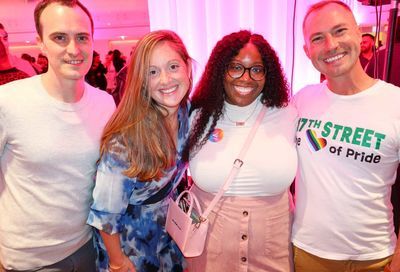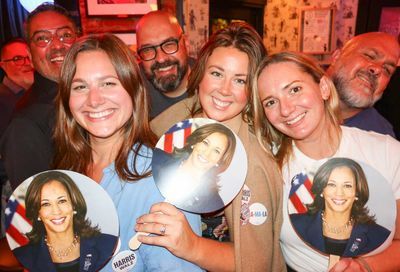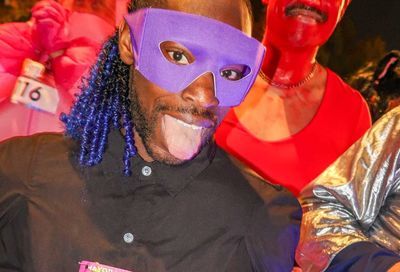DC Black Pride Goes Back to School
Sunday's Health & Wellness Expo was full of education, but even stronger on community and communication
With attendees filtering in and out, about 150 people filled the schoolyard of the Francis-Stevens Educational Complex Sunday, May 27, at any given time, all there to participate in the ”It’s a Family Affair” Health & Wellness Expo, one of many events that are part of the five-day celebration of DC Black Pride.
Alongside food and live entertainment, the main attraction was the local organizations that set up tables to reach out to the community, informing attendees of services, programs and upcoming events. Many in the crowd frequently referred to DC Black Pride as an opportunity to meet new people and network with like-minded individuals, both from inside and outside of D.C.
Eugene Alston, 70, of Baltimore, said he has been coming to DC Black Pride for the past six years. This year he brought two friends to the celebration, which he views as an opportunity to enjoy a greater sense of community.
”It’s important because it helps you identify yourself as part of a community, but you also realize we’re all people, no matter our differences,” he said.
Stephanie Lee, of Odenton, Md., has been coming to DC Black Pride for 10 years, dating back to when she lived in New York.
”I always love coming down here,” Lee said. ”The people are so friendly and nice. And I particularly like this expo, because it focuses on health and wellness, which is really important for the LGBT community. There’s so many challenges with resources, services that cater specifically to the LGBT community.”
Lee said the festival also serves as a chance for people from different places to network and form stronger relationships.
”I think it’s particularly important because it’s a forum for us to make the rest of the people aware of our issues,” she said. ”It’s a nice place for us to come together and share resources with each other, and people who are not part of the LGBT community can come to these events and find out more about us, just fellowship with us, and spend time with us – get to know we are just regular people like everyone else.”
Cory Corbett, program manager for Us Helping Us, People Into Living, an organization focused on improving the health and well-being of black gay men and on reducing the prevalence of HIV/AIDS in the black community, spent the afternoon handing out information about safe sex.
Corbett, echoing comments made by Lee, said higher rates of HIV and STD infection in the black community are still issues that need to be addressed, but that may get drowned out amid larger Capital Pride celebrations.
David M. Pérez of the Latino GLBT History Project, which has partnered with DC Black Pride to hold forums and other events, explained the importance of such partnerships.
”I think it’s really important to work together. A lot of us might have similar issues that aren’t talked about in the broader LGBT policy agenda sometimes,” he said. ”Communities of color have higher rates of some health issues, economic issues. We really want to stand together in solidarity, understand each other’s issues. I think we both have in common that we have multiple identities – LGBT and Latino, LGBT and African-American – and we can learn from and support each other.”
The festival also serves as a way for organizations or campaigns to mobilize volunteers and rally them to action. Karess Taylor-Hughes, the deputy canvassing director for Marylanders for Marriage Equality, the coalition seeking to uphold the recently passed marriage-equality law in the Free State, was busily collecting signatures of potential volunteers at one table.
”Black Pride to us means inclusion, it means reaching out to people,” she said. ”There may not be a lot of pride festivals in Maryland besides the one in Baltimore, so a lot of people on the Montgomery County/Prince George’s side will come to D.C., and this is where they’re going to be.”
Aside from those D.C. suburbanites, Taylor-Hughes also looked to recruit a few District residents for the Maryland fight.
”People think there’s this borderline between Maryland and D.C. that they can’t cross,” she said. ”But Marylanders helped out when D.C. needed their help, so D.C. can come out and help in Maryland.”
At a nearby table, Taylor-Hughes’s commonwealth counterpart from Equality Virginia, Tiara Davis, said she was also receiving positive feedback from people stopping by to chat. She said she, too, was trying to educate expo attendees of the work that the organization is doing in Virginia, and warning them not to write the state off as a lost cause.
”Just like many other places across the nation, nobody ever thought that we’d be where we are now,” Davis said. ”Virginia, like the rest of the country, will get on board – as long as there are people who are willing to fight for equality.”
Support Metro Weekly’s Journalism
These are challenging times for news organizations. And yet it’s crucial we stay active and provide vital resources and information to both our local readers and the world. So won’t you please take a moment and consider supporting Metro Weekly with a membership? For as little as $5 a month, you can help ensure Metro Weekly magazine and MetroWeekly.com remain free, viable resources as we provide the best, most diverse, culturally-resonant LGBTQ coverage in both the D.C. region and around the world. Memberships come with exclusive perks and discounts, your own personal digital delivery of each week’s magazine (and an archive), access to our Member's Lounge when it launches this fall, and exclusive members-only items like Metro Weekly Membership Mugs and Tote Bags! Check out all our membership levels here and please join us today!



















